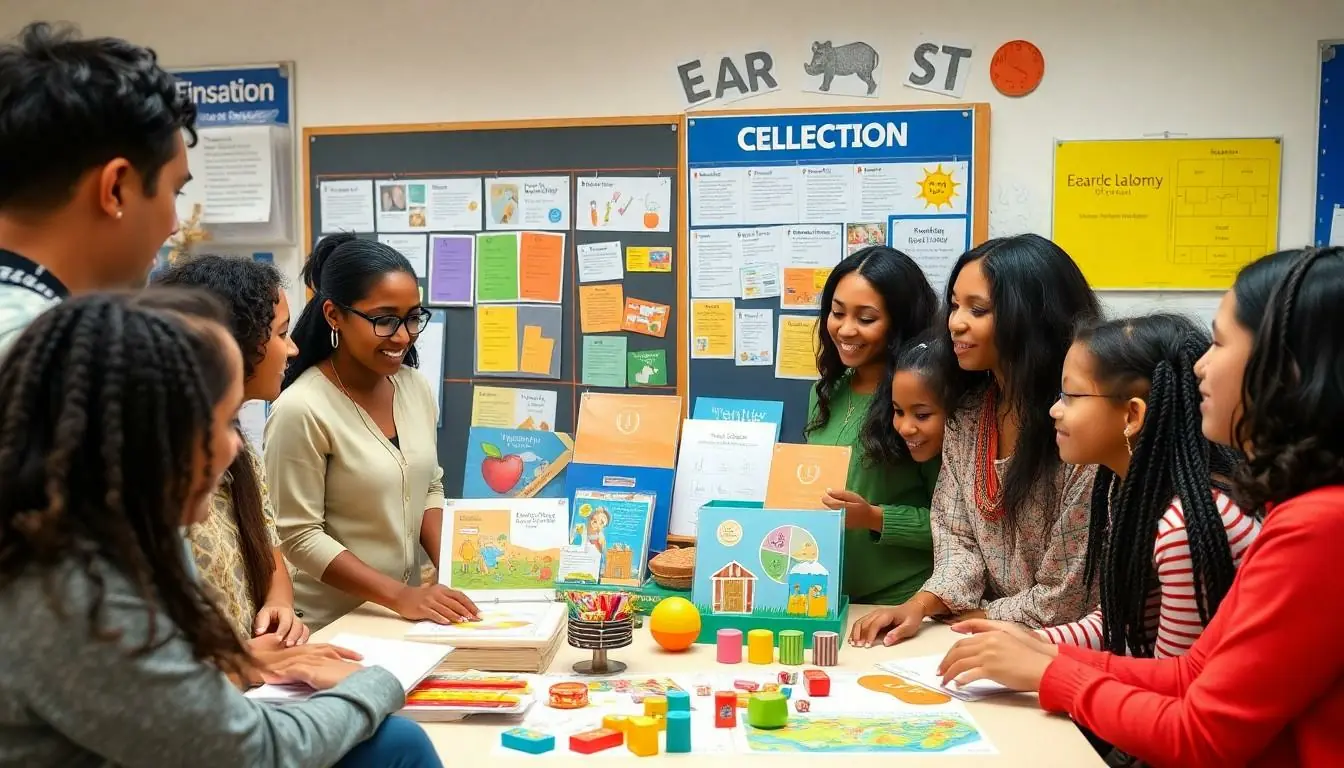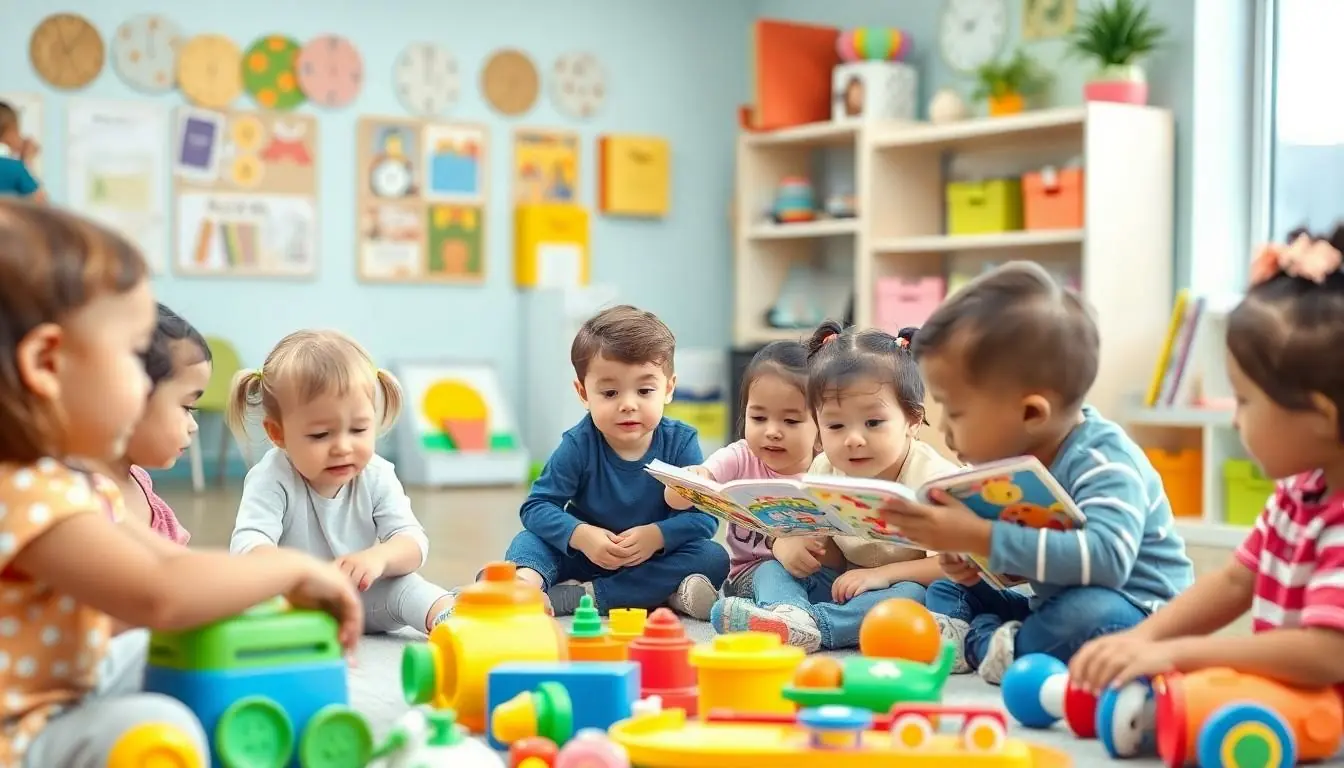Table of Contents
ToggleEarly childhood education is like the secret sauce that transforms little sprouts into mighty oaks of knowledge. But what’s in this magical mix? Enter the 12 core units that lay the foundation for nurturing young minds. These units aren’t just a checklist; they’re the essential building blocks that educators wield to create engaging and effective learning environments.
Overview of Early Childhood Education Units
Early childhood education consists of 12 essential units, each contributing to a comprehensive understanding of child development. These units ensure educators possess the necessary knowledge and skills to foster an enriching learning environment.
1. Child Development
Understanding child development principles is crucial for recognizing growth patterns and milestones. Educators study cognitive, emotional, and physical development stages.
2. Learning Theories
Familiarity with various learning theories guides educators in applying best practices. Knowledge of theorists such as Piaget and Vygotsky enriches lesson planning.
3. Curriculum Planning
Effective curriculum planning promotes interactive learning experiences. Educators design age-appropriate activities aligned with developmental goals.
4. Assessment and Evaluation
Ongoing assessment and evaluation help track children’s progress. Techniques include observations, portfolios, and standardized tests.
5. Family and Community Engagement
Building strong relationships with families supports children’s learning experiences. Educators involve families in curriculum discussions and school events.
6. Health, Safety, and Nutrition
Knowledge of health and safety regulations ensures well-being in educational settings. Lessons on nutrition foster healthy habits among young learners.
7. Diversity and Inclusion
Understanding diversity and inclusion enriches the educational experience. Educators implement strategies that respect and celebrate cultural differences.
8. Behavior Management
Effective behavior management strategies promote a positive learning environment. Techniques include clear expectations and consistent consequences.
9. Language and Literacy Development
Language and literacy development units focus on fostering communication skills. Educators introduce activities that enhance vocabulary and comprehension.
10. Social and Emotional Development
Supporting social and emotional development is vital for building resilience. Activities encourage empathy, cooperation, and conflict resolution.
11. Creativity and the Arts
Incorporating creativity and the arts stimulates imaginative thinking. Educators provide opportunities for artistic expression across various mediums.
12. Professionalism and Ethics
Professionalism and ethics guide educators in their interactions with children and families. Understanding ethical standards ensures a supportive educational environment.
Core Units in Early Childhood Education

These 12 core units form the foundation of effective early childhood education, enabling educators to support children’s growth and learning successfully.
Unit 1: Child Development
Understanding child development is essential for educators. This unit covers physical, cognitive, social, and emotional milestones. Educators learn to recognize individual needs concerning development stages. Effective strategies promote positive growth in various domains. Observation plays a crucial role in assessing progress.
Unit 2: Learning Theories
Learning theories guide educators in tailoring their teaching methods. This unit explores major theories such as behaviorism, constructivism, and social learning. Each theory offers insights into how children acquire knowledge. By applying these theories, educators can create engaging learning experiences. Different approaches cater to diverse student needs.
Unit 3: Curriculum Development
Curriculum development emphasizes creating effective and engaging educational materials. This unit addresses methods for aligning curriculum with developmental standards. Educators learn to integrate various subjects seamlessly. Important components include lesson planning, themes, and learning objectives. Continuous evaluation ensures the curriculum meets children’s interests and needs.
Unit 4: Family and Community Relationships
Building relationships with families and the community enhances children’s educational experiences. This unit focuses on strategies for effective communication and collaboration. Educators learn to involve families in their children’s learning. Community resources can support education, creating a network of support. Engagement fosters a sense of belonging and shared responsibility.
Unit 5: Health, Safety, and Nutrition
Health, safety, and nutrition are vital for children’s well-being and learning. This unit provides guidelines for creating a safe environment. Educators learn about proper nutrition and its impact on development. Knowledge of health policies and emergency procedures ensures children’s safety. Healthy habits contribute to long-term wellness.
Unit 6: Diversity and Inclusion
Diversity and inclusion promote equity in the classroom. This unit addresses strategies for celebrating cultural differences. Educators learn to create an environment where every child feels valued. Incorporating diverse perspectives enriches the learning experience. Inclusive practices support the growth of all learners.
Unit 7: Observation and Assessment
Observation and assessment techniques allow educators to track children’s progress effectively. This unit highlights different assessment methods and their purposes. Educators learn to document observations accurately. Analyzing assessment data helps inform instruction and support individual needs. Feedback ensures continuous improvement.
Unit 8: Professionalism and Ethics
Professionalism and ethics shape educators’ responsibilities and conduct. This unit emphasizes the importance of ethical practices in early childhood education. Educators learn about codes of conduct and professional standards. Commitment to ongoing professional development enhances effectiveness. Ethical decision-making fosters trust and respect within the educational community.
Unit 9: Guidance and Discipline
Guidance and discipline strategies support social and emotional development. This unit teaches positive behavior management techniques. Educators learn to foster self-regulation and conflict resolution skills. Approaches focus on proactive measures to encourage appropriate behavior. Consistent guidance promotes a positive learning environment.
Unit 10: Supporting Emergent Literacy
Supporting emergent literacy is crucial for developing reading and writing skills. This unit covers strategies for fostering language and communication. Engaging activities, such as storytelling and interactive reading, enhance literacy development. Educators learn to incorporate literacy throughout the curriculum. Early experiences lay the groundwork for future literacy success.
Unit 11: Play-Based Learning
Play-based learning is an effective approach for engaging young learners. This unit emphasizes the role of play in cognitive and social development. Educators discover how to create play-rich environments that promote exploration. Different types of play can support various learning objectives. Integrating play with structured activities fosters holistic development.
Unit 12: Technology in the Classroom
Technology in the classroom enhances learning opportunities. This unit explores the appropriate use of digital tools in early education. Educators learn about integrating technology to support curriculum goals. Understanding digital resources helps foster critical thinking and creativity. Responsible use of technology prepares children for the future.
Importance of Core Units in Child Education
Core units in early childhood education serve critical roles in shaping children’s learning experiences. Understanding child development helps educators recognize significant milestones in physical, cognitive, social, and emotional growth. Learning theories provide frameworks that guide tailored teaching methods for diverse learners.
Curriculum development focuses on creating educational materials that meet developmental standards and engage young minds effectively. Establishing strong family and community relationships enhances children’s educational experiences by fostering supportive partnerships. Health, safety, and nutrition units emphasize the necessity of safe environments and proper nourishment for optimal learning outcomes.
Embracing diversity and inclusion ensures that classrooms celebrate various cultures, promoting equity among all students. Observation and assessment strategies track children’s progress, allowing for informed adjustments in teaching approaches. Professionalism and ethics uphold strong educational standards that support both educators and students.
Guidance and discipline play pivotal roles in nurturing social and emotional development through positive behavior management techniques. Supporting emergent literacy equips children with essential language and communication skills necessary for reading and writing. Play-based learning champions exploration and creativity, using play as a tool for holistic development.
Technology integration enhances learning opportunities, preparing children for a future where digital skills are vital. Collectively, these core units provide invaluable foundations that empower educators to facilitate successful growth and learning in early childhood education.
The 12 core early childhood education units serve as vital components in shaping effective teaching practices. They equip educators with the knowledge and tools necessary to foster a nurturing and engaging learning environment. By focusing on child development, diverse learning theories, and strong community relationships, educators can significantly impact children’s growth.
These units not only enhance educational experiences but also emphasize the importance of health, safety, and inclusion. As educators embrace these foundational elements, they prepare young learners for a bright future filled with opportunities. Ultimately, a solid understanding of these core units ensures that every child receives the best possible start in their educational journey.




